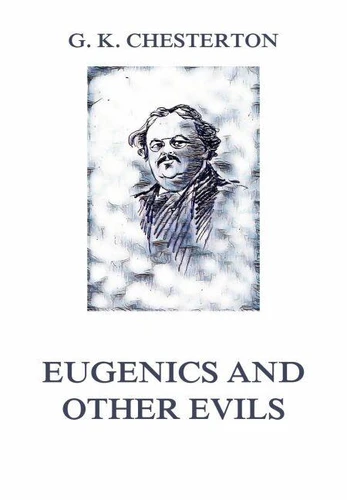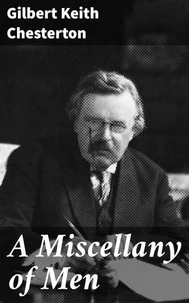Eugenics and other Evils
Par :Formats :
Disponible dans votre compte client Decitre ou Furet du Nord dès validation de votre commande. Le format ePub est :
- Compatible avec une lecture sur My Vivlio (smartphone, tablette, ordinateur)
- Compatible avec une lecture sur liseuses Vivlio
- Pour les liseuses autres que Vivlio, vous devez utiliser le logiciel Adobe Digital Edition. Non compatible avec la lecture sur les liseuses Kindle, Remarkable et Sony
 , qui est-ce ?
, qui est-ce ?Notre partenaire de plateforme de lecture numérique où vous retrouverez l'ensemble de vos ebooks gratuitement
Pour en savoir plus sur nos ebooks, consultez notre aide en ligne ici
- Nombre de pages188
- FormatePub
- ISBN978-3-8496-5096-4
- EAN9783849650964
- Date de parution18/01/2018
- Protection num.Digital Watermarking
- Taille254 Ko
- Infos supplémentairesepub
- ÉditeurJAZZYBEE VERLAG
Résumé
Before he has turned over half-a-dozen pages of Mr. Chesterton's book, the reader will feel as if he had been out in a high wind. Not, of course, the cold, steady-blowing north-easter that turns your clothes to paper, that blues your nose and finger-tips and temper. Never for one moment could the storm that rages between the covers of Eugenics and Other Evils be likened to that sort of thing. The book is chiefly concerned to oppose the segregation of the feeble-minded, and the principal argument brought forward by Mr.
Chesterton is that, in the case of the proposed and current legislation about feeble-mindedness, we are treating this state in exactly the same way as we treat lunacy, whereas, says he, insanity is a definite state, "an isolated thing like leprosy." There is an abysmal distance between the lunatic and the ordinary man, but when we come to feeble-mindedness there is no such line of demarcation.
Chesterton is that, in the case of the proposed and current legislation about feeble-mindedness, we are treating this state in exactly the same way as we treat lunacy, whereas, says he, insanity is a definite state, "an isolated thing like leprosy." There is an abysmal distance between the lunatic and the ordinary man, but when we come to feeble-mindedness there is no such line of demarcation.
Before he has turned over half-a-dozen pages of Mr. Chesterton's book, the reader will feel as if he had been out in a high wind. Not, of course, the cold, steady-blowing north-easter that turns your clothes to paper, that blues your nose and finger-tips and temper. Never for one moment could the storm that rages between the covers of Eugenics and Other Evils be likened to that sort of thing. The book is chiefly concerned to oppose the segregation of the feeble-minded, and the principal argument brought forward by Mr.
Chesterton is that, in the case of the proposed and current legislation about feeble-mindedness, we are treating this state in exactly the same way as we treat lunacy, whereas, says he, insanity is a definite state, "an isolated thing like leprosy." There is an abysmal distance between the lunatic and the ordinary man, but when we come to feeble-mindedness there is no such line of demarcation.
Chesterton is that, in the case of the proposed and current legislation about feeble-mindedness, we are treating this state in exactly the same way as we treat lunacy, whereas, says he, insanity is a definite state, "an isolated thing like leprosy." There is an abysmal distance between the lunatic and the ordinary man, but when we come to feeble-mindedness there is no such line of demarcation.













